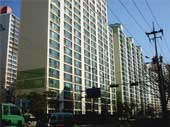South Korean landlords benefit from key money
South Korean rental market practice is pro-landlord.
Rents: Can landlord and tenant freely agree rents in South Korea?
Rents can be freely negotiated in South Korea, outside the growing public rental housing sector aimed at poor families, provided by the Korean National Housing Corporation.
Deposits

There are three systems in the Korean rental market, the jeongsei (sometimes called chonsei) system which comprises about 30% of all households and the two variants of wolse (or sageulse) system, comprises 14% of all households. The remaining 56% of households are owner-occupied.
Jeongsei, literally means money in full, sometimes called key money. The tenant gives the landlord key money amounting to 25% - 70% of the value of the property. No monthly rents are paid. At the end of the tenancy agreement, usually two years, the landlord returns the key money without interest and the tenant must move out unconditionally. Deductions can be made from the key money for repairs and damages. If the landlord is unable to return the key money, the tenant can stay until the money is returned.
The wolse system follows the usual monthly rental system with key money deposits of between ten to twenty times the monthly rent. The larger the deposit, the smaller is the monthly payment. The deposit is refundable without any interest. As with the jeongsei, the tenant can stay for free until the deposit is returned. Tenancy agreements typically last for two years.
Landlords generally prefer that rent for the entire lease agreement be paid upfront (sometimes called wolse 2). In this case, no deposits are required; and unless specifically stated in the contract, there is no refund for early termination.
To ensure that the deposit or the key money is returned, tenants are protected by the House Lease Protection Act. They have to create a security lien called Jeon-sae Seol-jung (literally long-term deposit lien), on the real property in the amount of the deposit. The landlord's permission is needed before this can be done.
What rights do landlords and tenants have in South Korea, especially as to duration of contract, and eviction?
In both systems, the tenant cannot renew the contract without the landlord's consent. The House Lease Protection Act stipulates a lease term of two years; however, typical contracts range from one to three years. It is common for contracts to allow the tenant to terminate the contract after staying half or more of the contract period. The tenant must prove reasonable cause for early termination, so as to avoid paying a penalty.

The acceptable reasons for termination (such as a diplomatic clause), notice and refund must be stated in the agreement. The general practice is that tenants should give two to three month's notice of intent to terminate the lease.
In the case of a breach of contract the tenant forfeits the contract money (10% of key money for Jeongsei and 10% monthly rent for wolse), however, when the landlord commits a breach of contract, he must pay double the contract money.
How effective is the South Korean legal system?
In the absence of a lien, tenants are still protected if the place is registered and if they personally occupy the place. In the Seoul metropolitan area the law grants a KRW16,000,000 (US$15,900) quasi-lien on the property. The quasi lien is easily enforceable in court.
The procedure is complicated, but recently a small claims court system has been introduced to reduce the burden of filing suit. A landlord can be sued for no more than 20 million won in a small claims court. In such proceedings, the tenant can institute an action by making oral statements rather than filing written petitions. Strict rules of evidence and procedure are also waived.
EVICTION FOR NON-PAYMENT OF RENT |
|
| Duration until completion of service of process | 30 |
| Duration of trial | 180 |
| Duration of enforcement | 93 |
| Total Days to Evict Tenant | 303 |
| Source: The Lex Mundi Project | |
Legislation
The House Lease Protection Act covers the return of key money and deposit. The Civil Code provides general protection to both parties.